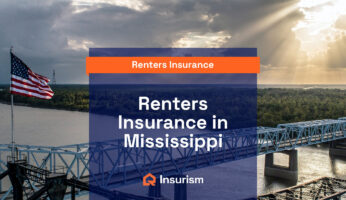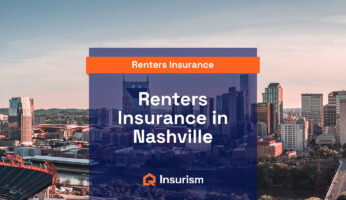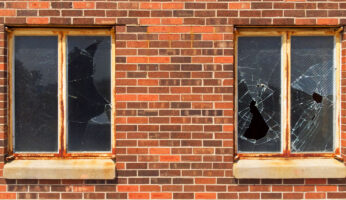Table of Contents
How does renters insurance cover lightning damage?
If lightning directly or indirectly damages your personal property, you can file a renters insurance claim requesting your insurance company to pay for the damage. Your insurance company will review your claim and reimburse you up to your coverage limit — an amount that you select when you get renters insurance.
If you have an actual cash value policy, your provider will pay out whatever your items were worth when you lost them (i.e. approximately what you’d have gotten if you sold them on eBay). If you have a replacement cost policy, your provider will reimburse you enough money to buy a brand new replacement for the damaged item.
What types of personal property are covered against lightning?
Renters insurance covers lightning damage to any property that you personally own, regardless of whether it’s stored inside or outside your home. This means that, among other things, renters insurance protects your:
- Computer
- Phone
- Appliances
- TV
- Bike
- Outdoor decorations
However, renters insurance doesn’t cover damage to your landlord’s property. If they own the appliances in your apartment, their own insurance policy will cover it against lightning damage, but yours won’t.
Renters insurance also doesn’t cover your car — that’s what your auto insurance is for.
Common types of damage caused by lightning
Renters insurance covers all types of lightning damage, including the following:
1. Direct physical damage
Lightning can cause objects to fracture or explode. If your property is destroyed by a direct hit (e.g. if lightning strikes your garden sculpture and it shatters), renters insurance will pay for the damage.
2. Lightning-induced fires
Fire is arguably the biggest danger caused by lightning. If a lightning strike ignites a fire in your home, your insurer will reimburse you for the cost of replacing your personal belongings.
No matter how devastating the fire was, you don’t have to file a claim for the damage to your building. Renters insurance doesn’t cover the actual structure of your home — it’s covered by your landlord’s insurance, and fixing it is their financial responsibility.
However, if the damage was so severe that your home was rendered uninhabitable, your renters insurance will also cover your additional living expenses while it’s being repaired. (These consist of anything extra that you spend while you can’t live in your home, such as restaurant and hotel bills that are more expensive than your usual rent and groceries.)
2. Power surge damage
Renters insurance always covers power surge damage to electronics when the surge was caused by lightning. (Other types of power surges are a different story — some policies cover them and some don’t, so check yours for details.)
Your policy might not fully cover electronics
Although lightning-induced power surges are covered, it’s important to note that your policy might have a special limit on how much it will cover electronics, regardless of what damages them.
Providers place caps (which in renters insurance are called sub-limits) on how much they’ll pay for certain classes of items. In many (although not all) renters insurance policies, electronics are only covered up to $1,500 or $2,500. Check your policy or call your insurer to see if your policy features an electronics sub-limit.
If it does, and you have expensive electronics that you want to fully cover from lightning damage, consider buying additional coverage for them with an addition to your renters insurance policy called an endorsement or rider.
3. Power outage losses
Even if lightning doesn’t directly strike your home, it can still cause a power outage that will affect your property.
Damage caused by lightning-induced power loss is usually covered by renters insurance. For instance, if the food in your fridge spoils due to an extended power outage, your renters insurance will reimburse you for the food loss.
For electronic data loss, such as your hard drive getting fried by a power surge, you’ll need to check your policy or contact your insurance agent to see if you’re fully covered. Many policies place sub-limits on electronic media, i.e. your data.
4. Falling trees or branches
If lightning strikes a tree near your home and it falls and damages your possessions, your provider will cover the loss. (In fact, because renters insurance also covers falling objects, this type of damage is covered regardless of why the tree fell — even if it fell for no discernible reason at all.)
How to protect your rental unit from lightning damage
There are three major ways you can protect your home from lightning damage:
Install a home lightning protection system
Installing a lightning protection system (LPS) is the best way to keep your home safe during thunderstorms. A good home protection system should have:
- Air terminals or lightning rods
- Conductors
- Surge suppressors
- A grounding system
All these things work together to ensure that when lightning strikes, it will be safely grounded and won’t cause a fire or dangerous electrical surge.
The downside is that lightning protection systems aren’t cheap. Simple systems with just a few components cost around $500 to install, and more sophisticated ones cost upwards of $2,500.
This is the kind of thing that your landlord might be willing to pay for (and probably should, unless you’re planning on uninstalling and taking it with you when you move out). If you live in an area that’s prone to extreme weather, contact them and see if they’re willing to consider installing an LPS. Emphasize the benefit to them — after all, your landlord doesn’t want to see their building get hit by lightning any more than you do.
Unplug your electronics and install surge protectors
It’s always a good idea to unplug your electronics during thunderstorms so that if there is a power surge, none of your property will be damaged.
Of course, while that’s a good idea, in practice most people don’t actually remember to do it. Fortunately, you can buy and install surge protectors to achieve the same effect. You can get a surge protector power strip with 6 to 12 outlets for $20–$30.
Get renters insurance
As you’ve probably gathered, renters insurance protects your things against lightning damage, as well as many other common disasters, such as fire and burglary.
Furthermore, renters insurance is very cost-effective. The average monthly price of renters insurance is around $15 to $20, which means that several months of coverage costs about the same as buying a few surge protectors. It’s also much, much cheaper than installing a lightning protection system, to say nothing of paying the full cost of your losses if lightning strikes your home.
Related Questions
- What is guest medical coverage in renters insurance?
- What is a sub-limit in renters insurance?
- Does renters insurance cover home-based businesses?
- Does renters insurance cover gold or silver bullion?
- What does "dependent in the care of" mean in renters insurance?
- Does State Farm renters insurance cover hotel stays?






